Is it possible to eat boiled corn while losing weight: calorie content, harm and benefits of the cereal
When following a dietary regimen, the body must receive a sufficient amount of proteins, carbohydrates, fats, micro- and macroelements, vitamins, but it is important that the energy value of the diet is not excessive. With the right approach, the diet menu can be complete and varied.
The list of healthy products includes boiled corn. Cereals contain practically no fat, but are rich in proteins and carbohydrates that the body needs to be full. In addition, the composition contains large quantities of plant fiber, which activates digestion, regulates energy metabolism, cleanses the gastrointestinal tract, removes excess fluid, which promotes weight loss.
Below we will look at the composition, harm and benefits of boiled corn for the body and separately for weight loss, consumption rates, cooking features, what products can be combined with and what are the contraindications.
Boiled corn
The culinary possibilities of corn are great. Freshly harvested cobs are ready to eat, but they prefer to be boiled. Due to its low calorie content and the presence of nutritional components, boiled corn is not only included in the list of permitted foods for weight loss, but is also used as the main ingredient in a diet program.
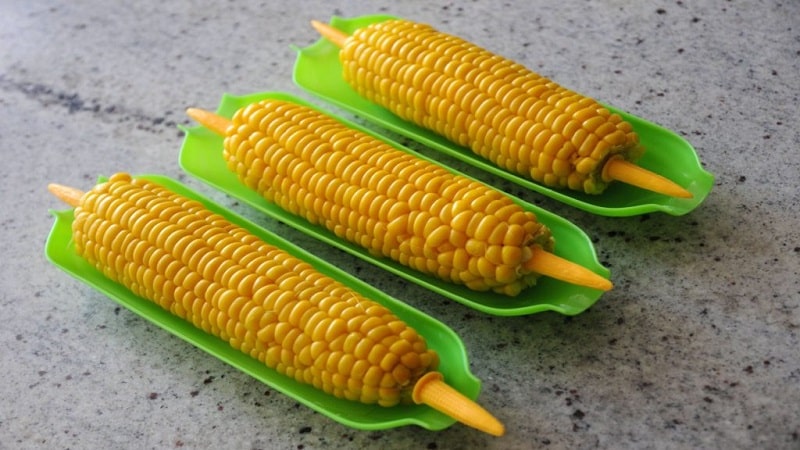
The corn diet is based on the inclusion of boiled cobs in the diet fresh young corn in the summer, corn porridge cooked in water without sugar and salt - the rest of the time.
There are different variations of the corn diet, differing in duration and the ability to include other foods in the diet.
A mono-diet is a strong stress factor for the body, as it is characterized by an unbalanced diet and insufficient intake of nutrients into the body. Therefore, the best option for correcting body weight is a physiologically complete, varied diet, limiting junk food and consuming healthy foods, including boiled corn.
Reference. For the purpose of losing weight, do not use canned corn grains, flakes, corn sticks, or popcorn, which is associated with the addition of sugar, salt, and other harmful substances to these products and the loss of its nutritional properties.
Composition, properties, vitamins and minerals
Corn contains a variety of components that determine its beneficial properties., provide human physiological needs for basic nutrients and serve as an energy supplier.
Chemical composition of yellow boiled corn:
- water;
- alimentary fiber;
- digestible carbohydrates: starch, glucose, sucrose, maltose, fructose, mono- and disaccharides;
- nonessential and essential amino acids;
- saturated fatty acids: stearic, palmitic;
- polyunsaturated fatty acids: linoleic, linolenic, omega-3 and omega-6 fatty acids;
- beta carotene;
- vitamin A;
- B vitamins: B1, B2, B4, B5, B6, B9, B12;
- vitamin C;
- vitamin D;
- vitamin E;
- vitamin H;
- vitamin K;
- vitamin PP;
- macroelements: calcium, potassium, phosphorus, magnesium, sodium;
- trace elements: copper, iron, manganese, zinc, selenium.
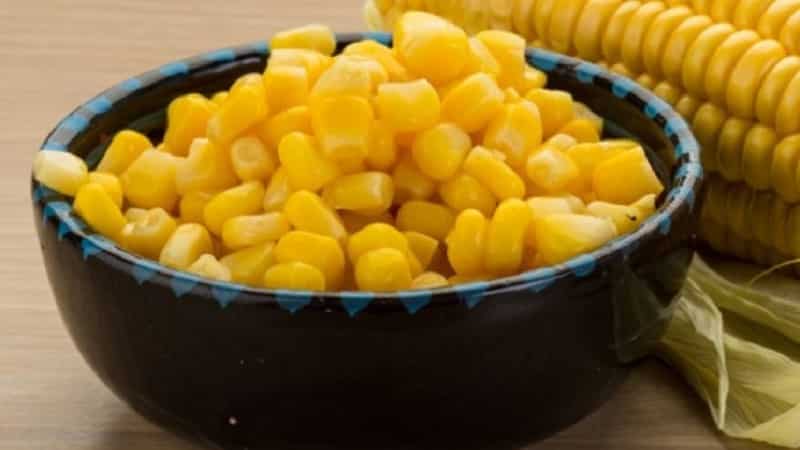
A person can regularly, but in moderation, consume boiled corn.. It provides the need for potassium and magnesium, which contribute to the functioning of the conduction system of the heart, stabilize blood pressure, determine the transmission of excitation from nerve cells, and participate in the regulation of protein and carbohydrate metabolism.
Corn is a source of calcium, the biochemical role of which is in the construction and formation of bone tissue, mineralization of teeth, the processes of transmission of nerve impulses, muscle contractions, and blood clotting. You cannot ignore the phosphorus present in the composition. It, in turn, actively helps calcium in the processes of mineralization of bone tissue, supports the normal course of energy metabolism, and normalizes the acid-base balance.
Boiled corn is recommended as an additional source of such micro- and macroelements:
- Iron. Necessary for the normal operation and functioning of the nervous and digestive systems, tissue respiration, and bone formation.
- Copper. A good antioxidant, participates in the synthesis of collagen fibers, strengthens the walls of blood vessels, is useful for the prevention of hypoxia, anemia, osteoporosis (reduces bone density).
- Zinc. It has an immunomodulatory effect, stimulates hair growth and restoration, and promotes the absorption of vitamin A.
- Manganese. Protects cells from damage by oxygen radicals, reduces cholesterol and blood sugar levels, which serves as a good prevention of diabetes.
- Selenium. Acts as an antioxidant, inhibits the growth of cancer cells, supports normal thyroid function, and strengthens the immune system.
Read also:
Calorie content of corn and features of its composition
Important role in ensuring and maintaining physiological processes the body is allocated to retinol, known as vitamin A. It plays a major role in antiviral and anticancer protection, slows down the aging process, normalizes metabolism, restores and maintains epithelial tissue, and takes part in the formation of visual perception.
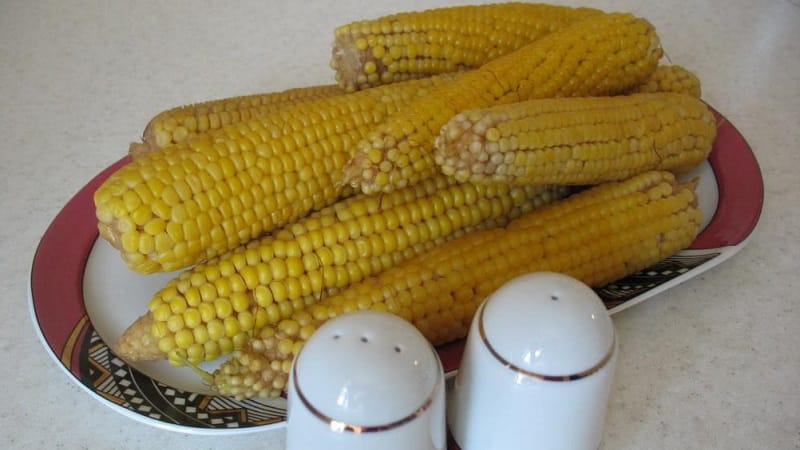
The product is rich in B vitamins, which perform a number of useful functions in the human body, in particular:
- regulate metabolism, fats, proteins, carbohydrates;
- support the health and normal functionality of the digestive and nervous systems;
- increase the body's resistance to stress factors;
- increase immunity;
- take part in neuromuscular transmission;
- promote regeneration and restoration of body tissues;
- protect skin from germs.
Besides, corn contains some vitamin C - a powerful antioxidant, vitamin E, which supports the normal activity of the gonads and has a good effect on the skin, vitamin D, which increases stamina and performance, improves the absorption of calcium.
Calorie content per 100 g, calorie content of the cob
The calorie content of corn depends on the type and method of preparation. and is 86 kcal in raw and 123 kcal in 100 g of boiled corn. The average 1 ear contains 160-220 kcal based on the seeds weighing 150-180 g.
BJU
100 g of yellow boiled corn contains 3.41 g protein, 1.5 g fat, 18.58 g carbohydrates. The nutritional value and chemical composition of corn are unstable and depend on the variety and method of cooking.
Is it possible to eat boiled corn while losing weight?
Nutritionists recommend that those losing weight include boiled ears of young corn in their daily diet.. The product contains a lot of plant fiber, which, like a sponge, cleanses the digestive tract of waste and toxins and quickly removes excess fluid from the body. Manganese and B vitamins lower cholesterol levels, which improves digestion and helps regulate weight.
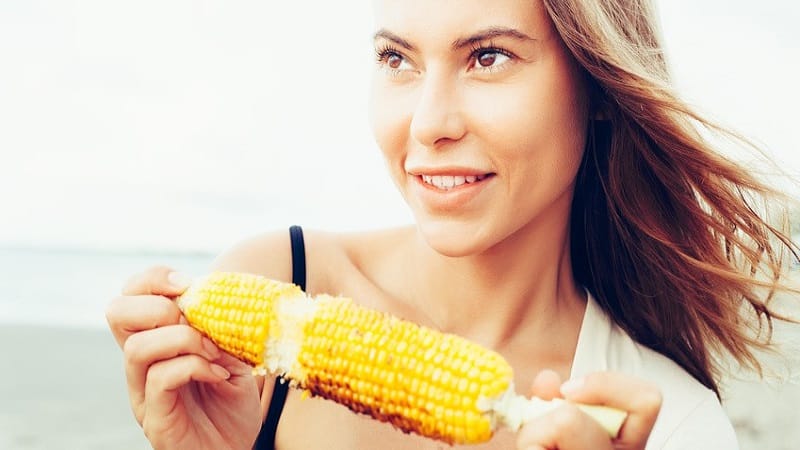
Weight loss also occurs due to the normalization of metabolic processes and activation of fat breakdown. Plant fiber saturates quickly and for a long time, the vitamin-mineral complex increases work capacity and physical activity, which leads to additional calorie burning.
Corn kernels act as a mild natural laxative: enhance intestinal motility, soften the consistency of stool, stimulate the act of defecation, reduce the time of bowel movement.
Advice. To increase the effectiveness of weight loss, it is recommended to take a tincture made from corn silk. The drink reduces appetite, reduces blood glucose levels, and increases the amount of urine excreted. To make the tincture, pour 200 g of dry stigmas into a thermos, pour in 500 ml of boiling water and leave for 4-5 hours. Take 100 ml half an hour before meals.
Consumption standards
The permissible amount of cereal depends on age, health status and the presence of concomitant diseases. On average, a healthy person is allowed to eat 150 g of grains per day (this is one average ear). In the presence of risk factors, during breastfeeding and pregnancy, for children and the elderly, the norm is reduced to 2-3 ears per week.
It is better to eat corn at lunch, then it is well and completely absorbed by the body and does not cause a feeling of discomfort and heaviness in the stomach in the evening.
Combination with other products
Additionally, almost all non-starchy vegetables are allowed to be included in the diet. (asparagus, cucumber, bell peppers, onions, garlic, assorted greens, lettuce), unsweetened fruits, low-calorie dairy products.
Boiled corn goes well with low-fat meats, fish, and other vegetables, steamed, in the oven, on the grill without the addition of vegetable and cooking fats. Boiled corn grains can be used as an ingredient in a diet salad, served with an omelet, or added to soup.
The benefits and harms of boiled corn
The greatest value for the body is young ears of corn, collected in July-August. They contain the maximum amount of vitamins and minerals necessary for the body to maintain vital processes and produce energy.
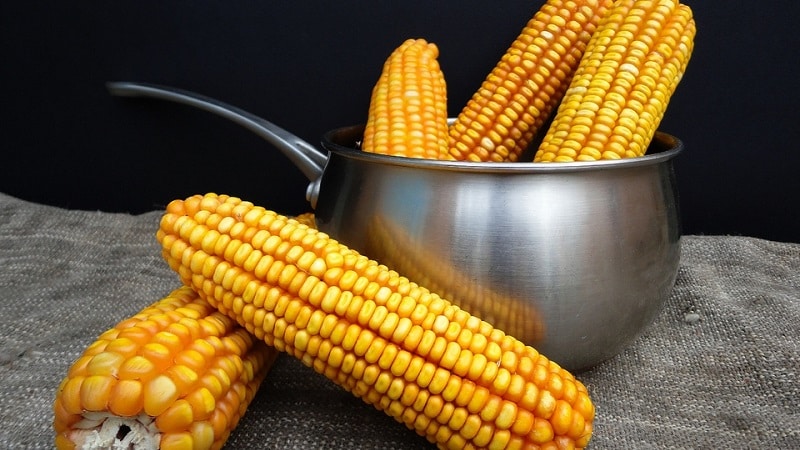
Properly grown vegetable without the use of nitrates has a diverse positive effect on the entire body, individual organs and organ systems:
- reduces cholesterol levels;
- improves the condition of the walls of blood vessels, increases their elasticity;
- supports normal functioning of the heart muscle;
- serves as a good prevention of atherosclerosis;
- produces a diuretic effect, removes waste and toxins from the intestines;
- cleanses the gallbladder and restores liver tissue;
- improves mood in people prone to depression;
- increases physical activity and endurance;
- normalizes night sleep;
- regulates energy metabolism;
- slows down the aging process;
- improves the condition of skin and hair;
- promotes the proper functioning of the nervous, endocrine, and digestive systems;
- Serves as a prevention of cancer.
Nutritionists classify boiled corn as a healthy food. However, in some cases, if used incorrectly or if there are contraindications, it can be harmful to health. Consumption of cereal crops with individual intolerance threatens an allergic reaction in the form of itching, peeling, skin rashes, and Quincke's edema.
In people prone to thrombophlebitis, can worsen the prognosis and provoke an exacerbation of the disease. Corn suppresses appetite, which is unacceptable when the body is exhausted. Excessive consumption of boiled corn during breastfeeding can cause colic in the baby.
This is interesting:
For children, men and women (including pregnant and lactating women)
Boiled corn is recommended for men as an additional source of zinc. It is necessary for sperm production and maintaining normal prostate function. Zinc is involved in the production of testosterone, the main male sex hormone responsible for the development of bone and muscle tissue, libido, sexual health, and maturation of follicles during ovulation.
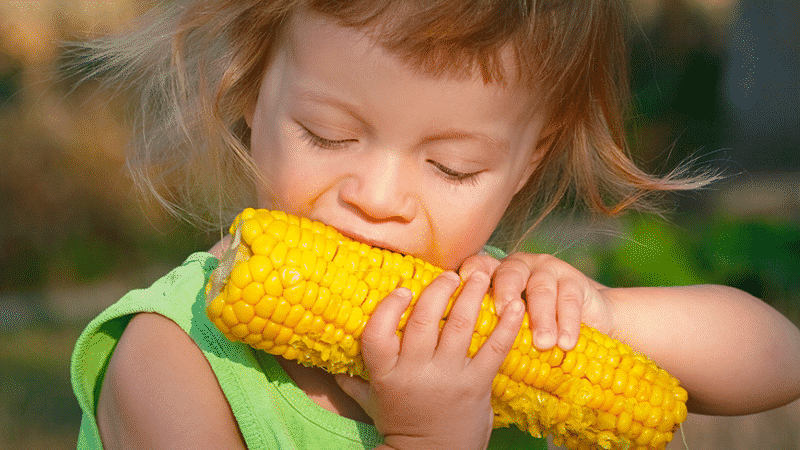
Young boiled corn is especially useful for children. It contains potassium, which is necessary for normal formation and growth of bones and mineralization of teeth. Potassium maintains acid-base balance and water-salt balance. With its deficiency, disturbances in the functioning of the cardiac and skeletal muscles occur.
A complex of vitamins and minerals promotes proper functioning nervous, digestive, endocrine, cardiovascular systems, strengthens the immune system, serves as a good prevention of influenza, acute respiratory viral infections, acute respiratory infections.
In late pregnancy, nutritionists recommend limiting the consumption of boiled corn.. But during breastfeeding, corn in moderate quantities is beneficial for a weakened female body. The product contains carbohydrates, which serve as a source of energy and take part in the regulation of osmotic pressure. The vitamin-mineral complex has a beneficial effect on the condition and functionality of the nervous, cardiovascular, and digestive systems.
For reference. Corn grains help normalize stool, activate intestinal motility, and facilitate bowel movements, which is extremely important for a woman during the postpartum period.
Besides, the cereal does not contain gluten, which means that the likelihood of an allergic reaction in a child is minimal. It is recommended to include boiled corn in the diet of a nursing woman, starting from the second to third month in the morning, in the amount of 50-70 g of boiled grains. If no adverse reactions are detected on the part of the child’s body, you can gradually increase the portion. You are allowed to eat no more than 2-3 cobs per week.
Cooking recommendations
To prepare juicy and tasty corn, buy young ears. The ripening time for cereal crops is mid-July - late August. Pay attention to the grains: they should be milky white or light yellow in color (the older the corn, the brighter and more saturated the color of the grains), elastic, of the same size, tightly adjacent to each other, without signs of spoilage.
Advice. It is not recommended to buy corn cobs without leaves.Young corn has panicles at the tops and leaves that are fresh and green in color.
The most gentle option for cooking corn compared to boiling is steaming. With this method of culinary processing, the chemical composition remains practically unchanged, and the usefulness of the cereal for the body does not decrease.
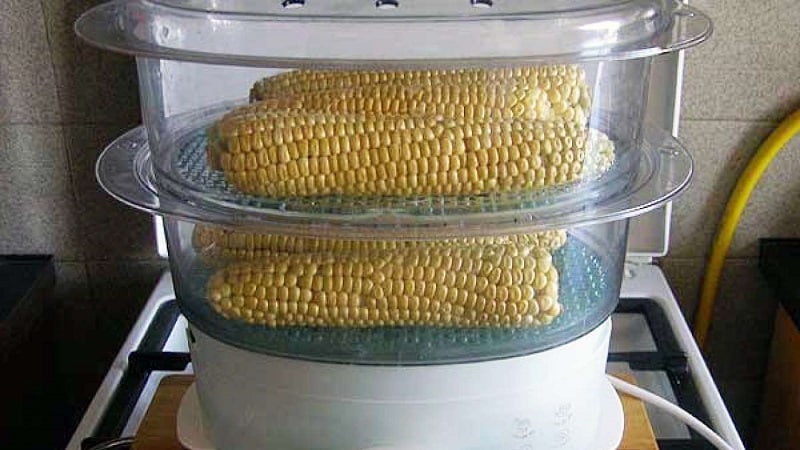
To steam corn using a slow cooker, you need to clean the cobs from leaves and panicles, rinse well under water. Next, pour 2 glasses of water into the main bowl, place a container for steaming on top, lay out the cobs, close the lid, and turn on the “steam” program.
Cooking time depends on the degree of maturity of the cereal: 10-15 minutes for young grains, 25-30 minutes for more mature ones.
There are general recommendations and life hacks on how to cook tasty and healthy corn.:
- Before cooking, soak de-leafed corn in cold water for an hour to soften the kernels.
- You can boil corn with leaves, after removing the panicles on the tops, which will make the product more aromatic and juicy.
- Cook corn without adding salt to the water, as salt makes the grains harder. Salt ready-made hot corn if desired. When following a dietary regimen, it is better to limit salt, as it retains fluid, disrupts the water-salt balance, which slows down the process of losing weight.
- The optimal cooking time for young grains is no more than 20 minutes, for overripe ones - 2-2.5 hours. Check readiness with a skewer or taste it.
- To ensure the corn cooks evenly, choose cobs that are the same size. If the cobs are large, cut them in half before cooking.
- Overripe grains will be soft and juicy if you first soak them in cold water with milk in a 1:1 ratio for 4-5 hours. Then cook in the usual way.
- For cooking over a fire, use a cast iron pan with thick walls and a bottom. Cook with the lid closed.
- You can cook corn in a microwave, double boiler, or bake in the oven.
- Place the cobs in boiling water.
- During the cooking process, add a pinch of sugar and 10-20 g of butter to the water. The grains will be more juicy and tender.
- It is better to eat corn hot, as it becomes hard as it cools.
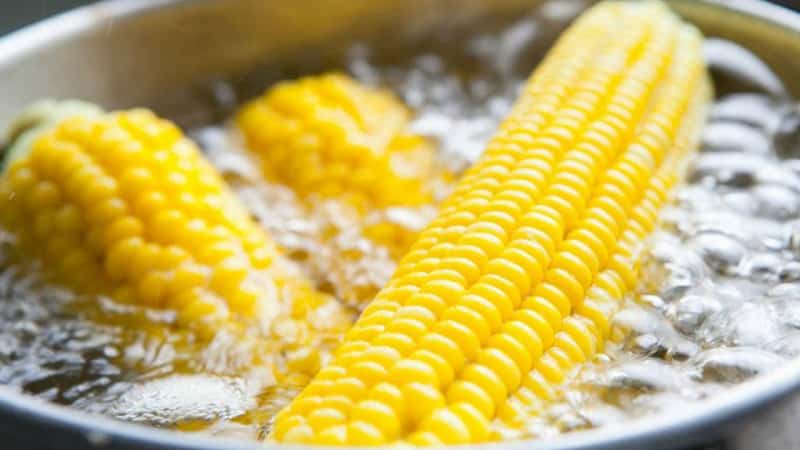
Contraindications
An absolute contraindication to boiled corn is individual intolerance to the component(s) of the composition. It is recommended to partially or completely limit the product if you have diseases such as:
- increased blood clotting;
- thrombophlebitis;
- anemia;
- diabetes;
- diseases of the gastrointestinal tract during exacerbation.
Elderly people are advised to eat with caution and children during pregnancy and breastfeeding.
Conclusion
Boiled corn is a valuable food product. With the correct cooking technology and cultivation without the use of pesticides, it has a beneficial effect on the functioning of the heart, blood vessels, digestive organs, and nervous system. The plant fiber in the composition promotes weight loss, activates the gastrointestinal tract, cleanses the kidney, liver systems, and blood from waste and toxins.
Corn goes well with vegetables, fruits, lean meats, fish, and poultry, which allows you to diversify your diet menu. Cereals have a number of absolute and relative contraindications that must be excluded before consumption.